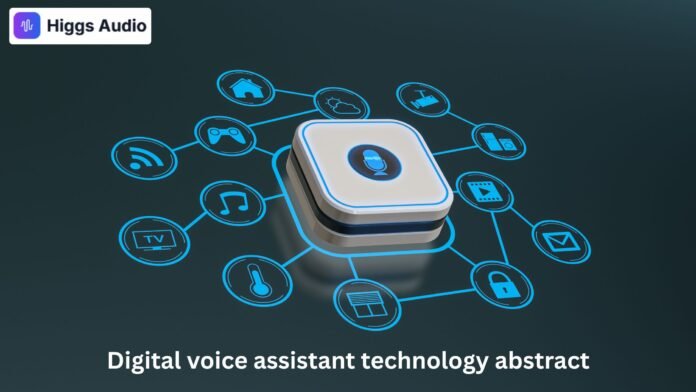The Voice of the Future: An AI That Clones in Seconds
The ability to create realistic, high-quality synthetic speech has long been the holy grail of audio technology. For content creators, developers, and storytellers, the power to generate a perfect voice on demand, without the need for expensive studio time or cumbersome recordings, is a game-changer. Yet, until recently, this process was either prohibitively complex or yielded results that sounded robotic and unnatural.
Enter Higgs Audio v2, a revolutionary voice synthesis model that is changing the industry with its zero-shot voice cloning capabilities. In a matter of seconds, this groundbreaking technology can analyze a short audio sample and generate high-fidelity, 24kHz audio that captures the unique tone and cadence of the original voice. The founder behind Higgs Audio isn’t just building a new tool; they are pioneering a new standard for voice-driven content, making it accessible and efficient for everyone.
The “Zero-Shot” Revolution: From Text to Perfect Audio
The secret to Higgs Audio’s success lies in its sophisticated zero-shot cloning technology. Unlike traditional voice models that require extensive data to be trained on a new voice, Higgs Audio v2 can create a high-fidelity clone from just a few seconds of a voice sample. This “zero-shot” capability is a monumental leap forward, eliminating a major barrier to entry for creators.
Higgs Audio’s unique approach is rooted in its foundational model, which is built on a massive dataset of 10 million hours of meticulously processed audio. This clean, annotated data, referred to by the team as “AudioVerse,” allows the AI to understand not just the words being spoken, but also the emotional intent, prosody, and acoustic nuances of human speech. This deep understanding is what enables the model to produce output that is both high-fidelity and emotionally expressive.
The Challenge of Quality and Consistency
The journey to developing Higgs Audio v2 was far from simple. The founder and their team had to overcome a series of technical hurdles to deliver a product that was truly professional-grade. The primary challenge was maintaining voice consistency and emotional authenticity over long-form content. Many earlier models could generate a short, impressive clip, but would suffer from voice drift, a flattening of emotion, or a breakdown of natural rhythm when generating a 20-minute podcast or an entire audiobook.
Higgs Audio v2 addresses this by being built like a large language model (LLM), which allows it to understand context over long sequences of text. It “remembers” the initial voice and tone, ensuring that the character’s voice remains consistent throughout. Furthermore, the model can handle complex tasks like multi-speaker conversations, intelligently matching energy and emotion between different speakers, making it an invaluable tool for creating realistic dialogues for video games, podcasts, and animated shorts.
The Democratization of Voice Content Creation
Higgs Audio’s mission is fundamentally about democratization. By making professional-grade voice cloning accessible and affordable, the platform empowers a new wave of creators who may not have the resources to hire voice actors or book expensive studio time.
The applications are boundless:
- Podcasters can generate consistent intros and outros or even entire segments in a cloned voice.
- Game developers can create rich, dynamic dialogue for non-player characters without a massive voice acting budget.
- E-learning platforms can use the same voice for a series of courses, providing a consistent and professional experience for learners.
- Filmmakers and video creators can dub their content with emotionally resonant voices that sound native and authentic.
Higgs Audio v2’s ability to generate high-fidelity 24kHz audio, a significant upgrade from the industry standard 16kHz, further cements its position as a leading force in the market. The difference is subtle but critical for any professional use case, where clarity and richness of sound are paramount.
Key Takeaways for Innovators
The story of Higgs Audio offers a powerful blueprint for any founder looking to make an impact in the tech world:
- Solve a Core Technical Problem: The team didn’t just build a new text-to-speech model; they solved the complex problem of high-quality, zero-shot voice cloning, a major pain point in the industry.
- Focus on Professional-Grade Output: In a market full of consumer-level tools, prioritizing professional-grade quality (e.g., 24kHz audio) created a significant competitive advantage.
- Think Beyond the Tool: Higgs Audio isn’t just a voice generator; it’s a platform that enables new forms of creativity and content, empowering users to tell stories in new ways.
Shaping the Future, One Voice at a Time
As AI continues to blur the lines between human and machine-generated content, Higgs Audio stands as a testament to the power of targeted innovation. By making high-fidelity voice cloning accessible, the company is not just creating a new technology; it is building the foundation for a more creative, efficient, and democratized audio landscape.
Are you a startup founder or innovator with a story to tell? We want to hear from you! Submit Your Startup to be featured on Taalk.com.











